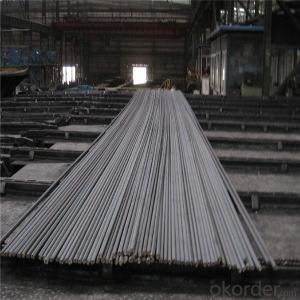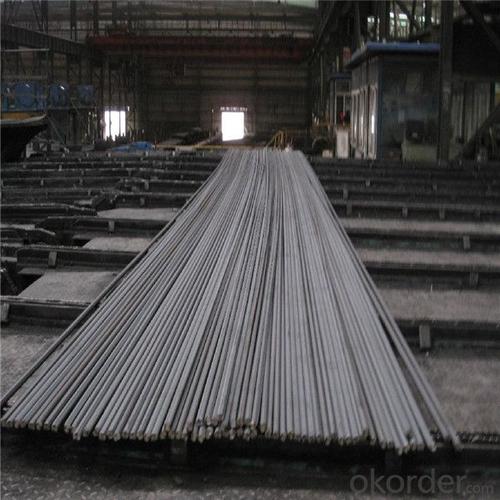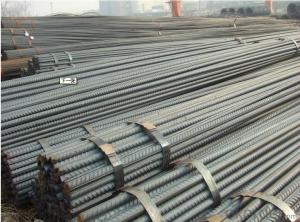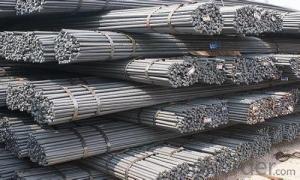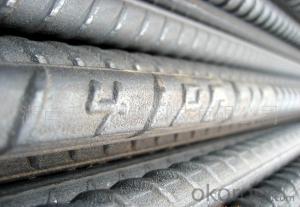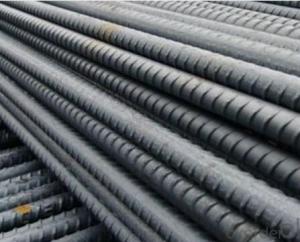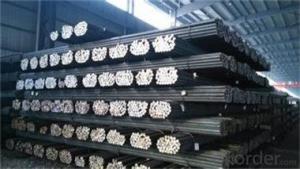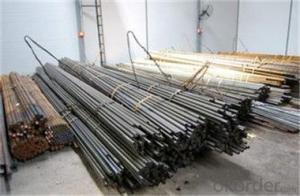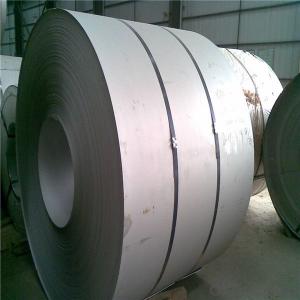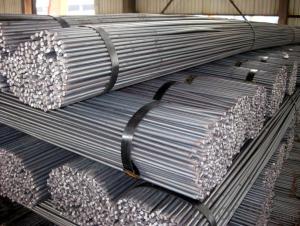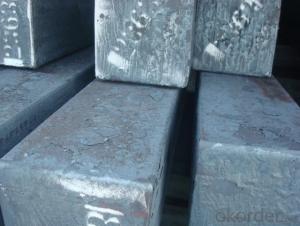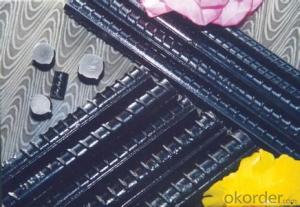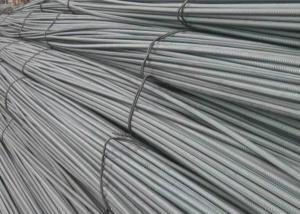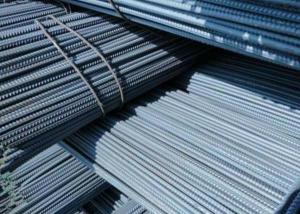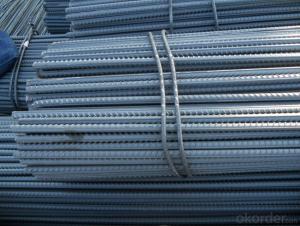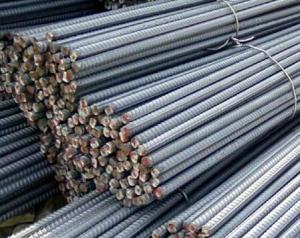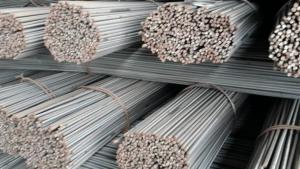Hot rolled steel rebar factory price of china mill
- Loading Port:
- Ningbo
- Payment Terms:
- TT OR LC
- Min Order Qty:
- 100 m.t.
- Supply Capability:
- 19000 m.t./month
OKorder Service Pledge
OKorder Financial Service
You Might Also Like
Specification
Rebar is common steel reinforcing bar, an important component of reinforced concrete and reinforced masonry structures.
It is usually formed from mild steel, and is given ridges for better frictional adhesion to the concrete.
Concrete is a material that is very strong in compression, but virtually without strength in tension. To compensate for this
imbalance in concrete's behavior, rebar is formed into it to carry the tensile loads.
.Most grades of steel used in rebar cannot accept welding; such as, to adjacent steel plates or as means to bind single
pieces of rebar together. However, special grades of rebar steel and welding rods make welding by expert welders possible.
Features
1、Pure steel quality, stable chemical contents, small tolerance.
2、Constant Quality, good drawing performance.
3、High dimension accuracy degree, accuracy degree of Level C up to 80%, smooth surface, less scale, easy to be pickled.
4、Automatic bundling with 4 lines by Machine in tidy and good looks
5、Big high quality percentage, small coil percentage, and heavy coil weight for Hard Coil.
6、High sorbitizing percentage.
Product Description :
Chemical composition (%): | Steel | C | Si | Mn | P | S | Ceq | ||||
HRB335 |
0.25 |
0.80 |
1.60 |
0.045 |
0.045 | 0.52 | |||||
HRB400 | 0.54 | ||||||||||
HRB500 | 0.55 | ||||||||||
Mechanical properties | Steel | Rel/ MPa | Rm/ MPa | A/ % | Agt/ % | ||||||
≥ | |||||||||||
HRB335 | 335 | 455 | 17 |
7.5 | |||||||
HRB400 | 400 | 540 | 16 | ||||||||
HRB500 | 500 | 630 | 15 | ||||||||
Package: | Standard export packing or as customer's request | ||||||||||
Application: | Construction, building, bridge, road. ect | ||||||||||
Payment terms | 1).100% irrevocable L/C at sight. | ||||||||||
Delivery time | 15-30 days after receipt of L/C or deposit by T/T | ||||||||||
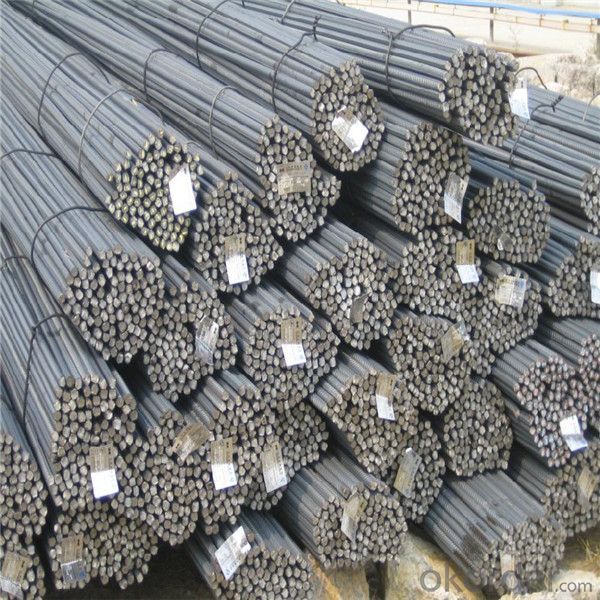
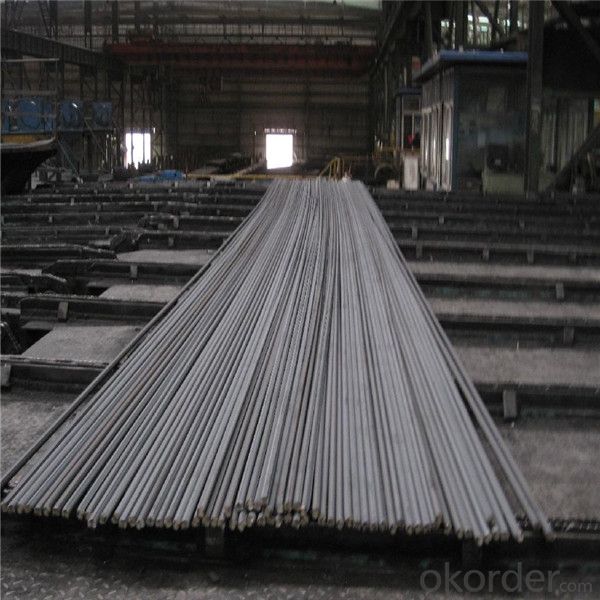
Packing:
In bundles, each bundle weight 3.5 tons. Load by container or by bulk verssel.
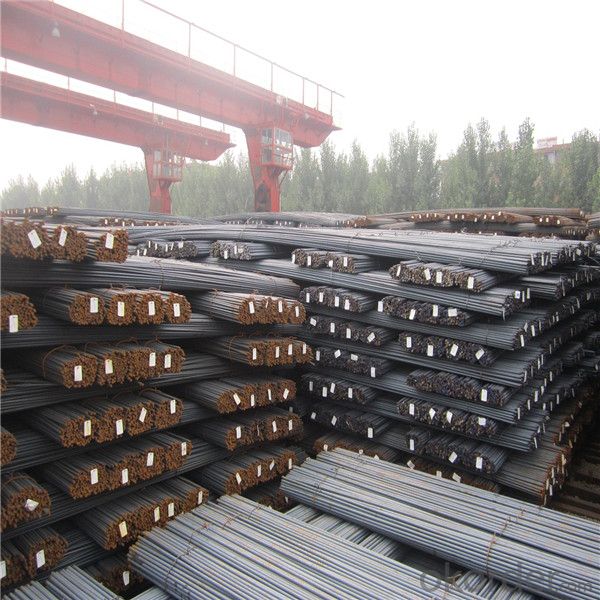
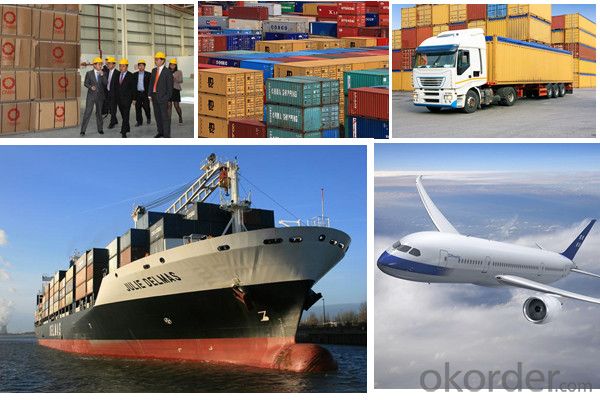
Our service
(1) We cooperate with famous factories with advanced equipment and well trained workers.
(2) We can provide factory price with trading company service.
(3) We continuously work on the improvement of our processes, guaranteeing consistently high standards
of quality to keep none compensation.
(4) We guarantee 24 hours response and 48 hours solution providing service.
(5) We accept small order quantity before formal cooperation.
(6) We deliver the agreed quality at the agreed time, reacting to changes in customer wishes in a flexible way.
(7) Due to our volume and selling power, we have excellent freight rates with shipping lines.
(8) We strive to always be fair and honest in our dealings with customers.
(9) We strive to work together with customers to achieve much more than we can achieve alone.
(10) Through our passion and commitment we aim to be a market leader in all our key markets. To maintain
our position as market leader we must continue to add value in all that we do.
FAQ:
1.Q: What's your MOQ(minimum order quantity)?
A: One full container, mixed acceptable .
2. Q: What's your packing methods?
A: Packed in bundle or bulk ..
3. Q: How can I buy CNBM products in my country?
A:Please send us an inquiry or email ,we will reply to you if there is distributor in your country
4. Q: Can we visit your factory?
A: Warmly welcome. Once we have your schedule, we will arrange the professional sales team to follow up your case.
5. Q: How long does it take to get the product if i place an order?
A:With the process of your requirements,we will pack and deliver in 3-7 days. If it is by sea shipment,it will take 15-45 days depending on different locations
- Q: What is the difference between the II and III grades of threaded steel?
- Compared with traditional II grade steel, the characteristics are as follows:1, high corrosion resistance, can be a large number of security reserves.2. In the chemical composition, because of the low carbon equivalent of the new third grade steel, the welding performance is good.3, high strength ratio, meet the seismic performance requirements. Particularly suitable for high-rise buildings and high seismic performance requirements of the project.4, cold bending performance is good, can be repeatedly bent, more in line with and meet the construction requirements of the construction.5, because of the high strength, can reduce the use of steel, effectively solve the problem of reinforcing steel bars too close, easy to concrete pouring. At the same time, it also reduces the cost of steel transportation and on-site processing.
- Q: Are steel rebars suitable for use in earthquake-prone regions?
- Yes, steel rebars are suitable for use in earthquake-prone regions. Steel rebars are widely used in construction due to their high tensile strength and ductility, which allows them to absorb and distribute seismic forces during an earthquake. Additionally, steel rebars can be reinforced with epoxy coatings or corrosion-resistant materials, increasing their durability and longevity in earthquake-prone areas.
- Q: What is the difference between rebar bolts and steel bars?
- Rebar is only material, and thread steel bolt is the product after the thread steel is processed.
- Q: Can steel rebars be used in the construction of nuclear power plants?
- Yes, steel rebars can be used in the construction of nuclear power plants. Steel rebars are commonly used as reinforcement in concrete structures, including those in nuclear power plants. They provide strength and stability to the concrete, ensuring the integrity of the structure. However, specific regulations and standards must be followed to ensure the rebars meet the required quality and safety standards for nuclear facilities.
- Q: Can steel rebars be used in seawater desalination plants?
- Steel rebars are indeed applicable in seawater desalination plants; however, careful consideration must be given to the potential impact of corrosion caused by the high salt concentration in seawater. To address this concern, several measures can be adopted. One popular approach involves employing corrosion-resistant alloys like stainless steel rebars or epoxy-coated rebars to shield against the corrosive effects of saltwater. Furthermore, regular maintenance and monitoring are essential for averting and detecting any corrosion-related problems. In conclusion, although steel rebars can be utilized in seawater desalination plants, it is imperative to incorporate corrosion protection strategies to ensure their durability and structural soundness.
- Q: What is the typical lead time for ordering steel rebars?
- The typical lead time for ordering steel rebars can vary depending on several factors. These factors include the quantity of rebars needed, the specific grade and size of rebars required, as well as the availability and location of the supplier. In general, if the rebars are readily available and in stock, the lead time can range from a few days to a couple of weeks. This is assuming that the supplier has the necessary inventory to fulfill the order and the logistics for transportation are straightforward. However, if the rebars need to be specially manufactured or if they are in high demand, the lead time can be longer. In such cases, it may take several weeks or even months to receive the rebars. This can be particularly true for large or custom orders that require special fabrication processes or if the supplier is experiencing production constraints. It is important to communicate with the supplier and provide them with all the necessary information about the specific requirements of the project to get a more accurate estimate of the lead time. Additionally, it is recommended to plan ahead and place the order well in advance to ensure the timely arrival of the rebars, especially for projects with strict deadlines.
- Q: How can the quality of steel rebars be tested?
- To ensure the strength and reliability of steel rebars, there are various methods available for testing their quality. Some commonly used techniques include: 1. Conducting a visual inspection to identify any visible defects like surface cracks, unevenness, or corrosion that may impact performance. 2. Analyzing the chemical composition of the rebars through spectroscopy or similar methods to ensure compliance with required standards. This analysis verifies the presence and percentage of elements such as carbon, manganese, and silicon. 3. Testing the rebars' tensile strength by subjecting a sample to tension until it fractures. The maximum force applied before breaking determines the tensile strength and helps identify weak spots or inconsistencies. 4. Evaluating the ductility of rebars through a bend test, bending them to a specific angle without any signs of cracking or fracture. This ensures the rebars can withstand bending and shaping during construction without compromising their structural integrity. 5. Using ultrasonic testing to detect internal flaws or defects within the rebars. This non-destructive method helps identify hidden cracks, voids, or inclusions that could weaken the rebars. 6. Determining the hardness of the rebars using the Rockwell or Brinell hardness test. This test measures the resistance of the rebar's surface to indentation, providing insight into its strength. 7. Subjecting the rebars to corrosion resistance testing, such as salt spray testing or electrochemical methods, to assess their resistance against rust and other types of corrosion. By combining these testing methods, manufacturers, construction companies, and engineers can ensure that steel rebars meet the required quality standards and can withstand the intended load and environmental conditions.
- Q: How are steel rebars protected against chemical attacks in concrete?
- Steel rebars are protected against chemical attacks in concrete by using different strategies such as using high-quality concrete with low permeability, adding corrosion inhibitors or protective coatings to the rebars, and ensuring proper concrete cover to prevent direct contact between the steel and aggressive chemicals.
- Q: What is the impact of steel rebars on the sustainability of a structure?
- Steel rebars have a significant impact on the sustainability of a structure. Firstly, the use of steel rebars enhances the durability and longevity of the structure. Steel is a highly durable material that can withstand extreme weather conditions, seismic activities, and heavy loads. This means that structures reinforced with steel rebars have a longer lifespan, reducing the need for frequent repairs or replacement. Furthermore, steel rebars contribute to the structural integrity of a building. By reinforcing concrete, steel rebars help to prevent cracks and fractures, ensuring the stability and safety of the structure. This reduces the risk of structural failure, which can have catastrophic consequences. In terms of sustainability, the use of steel rebars also leads to resource efficiency. Steel is a highly recyclable material, with a recycling rate of over 90%. This means that at the end of a structure's life, the steel rebars can be easily recycled and used again, reducing the demand for virgin steel production. This not only conserves natural resources but also reduces energy consumption and greenhouse gas emissions associated with steel production. Additionally, the use of steel rebars allows for flexibility in design and construction. Steel rebars can be easily shaped and bent to fit specific structural requirements, allowing for more efficient use of materials and reducing waste. This flexibility also enables the construction of complex and innovative structures, promoting architectural diversity and creativity. Lastly, steel rebars offer resistance to fire, which is crucial for the safety of a structure and its occupants. Steel does not burn or contribute to the spread of fire, providing a higher level of fire resistance compared to other materials. This feature enhances the overall sustainability of a structure by reducing the risk of fire-related damage and loss. In conclusion, steel rebars have a positive impact on the sustainability of a structure. They enhance durability, contribute to structural integrity, promote resource efficiency through recycling, enable flexibility in design and construction, and provide resistance to fire. These factors collectively enhance the lifespan, safety, and environmental performance of a structure, making steel rebars a crucial component for sustainable construction.
- Q: How do steel rebars bond with concrete?
- Steel rebars bond with concrete through a process called mechanical interlocking, where the rough surface of rebars provides a strong grip with the concrete. Additionally, during the curing process, a chemical reaction occurs between the alkaline environment of concrete and the iron surface of the rebars, forming a layer of iron oxide that further enhances the bond strength.
Send your message to us
Hot rolled steel rebar factory price of china mill
- Loading Port:
- Ningbo
- Payment Terms:
- TT OR LC
- Min Order Qty:
- 100 m.t.
- Supply Capability:
- 19000 m.t./month
OKorder Service Pledge
OKorder Financial Service
Similar products
Hot products
Hot Searches
Related keywords
